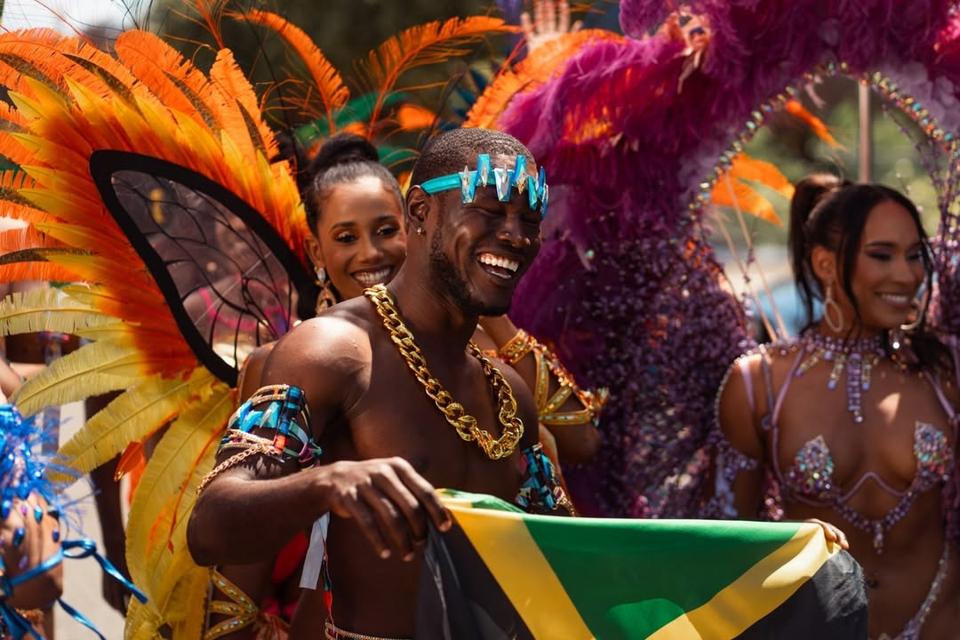Carnival season in the Caribbean is much more than a celebration of music, culture, and community—it’s an economic powerhouse. The recent Carnival in Jamaica 2025 has shattered previous records, with the island recording its highest-ever visitor arrivals for the annual celebration. According to the Jamaica Tourist Board (JTB), preliminary data indicates that between April 22 and April 27, 8,571 visitors arrived in the country, marking a 15.5% increase over the same period in 2024. Total passenger arrivals surged to 16,958, representing a 20% year-over-year increase.
These record-breaking numbers translate directly into economic opportunities for the region, especially for millennial entrepreneurs carving out a niche in costume design, event production, and hospitality services. As Jamaica’s Minister of Tourism, Hon. Edmund Bartlett told me, “Carnival has proven itself as a powerful economic driver, showcasing Jamaica beyond our beaches and reinforcing our vision to position the island as the Caribbean’s premier destination for world-class cultural experiences.”
Millennials Leading the Charge
Costume designers like Lila Nikole are redefining what it means to build a business in the Caribbean during Carnival season. Nikole, who first entered the carnival space in 2018, has since created a multi-faceted business model that includes costume design, manufacturing, and event production for major bands across Trinidad, Jamaica, and Miami.
“It went from nobody knowing who I was to suddenly being everywhere,” she shares. “Carnival is this beautiful, vibrant experience, but it’s also a business—a very lucrative one.”
Nikole’s success is indicative of a broader trend: young Caribbean entrepreneurs are using Carnival as a launchpad for sustainable businesses.
“The entrepreneurial spirit of the young is being given exposure and opportunity for expression through initiatives like the Tourism Enhancement Fund, which supports innovation and startup development,” Minister Bartlett says. He also emphasized the critical role of the Tourism Innovation Incubator, which provides funding and resources for new business ventures tied to cultural tourism.
The Economic Ripple Effect
The impact of Carnival in Jamaica extends far beyond the parade route. Preliminary projections suggest that Carnival in Jamaica 2025 will significantly surpass the J$4.42 billion (US $27.8 million) in direct economic impact recorded in 2024. The total economic contribution, including the multiplier effect, is expected to exceed J$95.4 billion (US $600 million). Minister Bartlett attributes this growth not only to increased tourism but also to the involvement of local entrepreneurs across various sectors—from costume makers to hospitality providers.
Kamal Bankay, Chairman of the Tourism Enhancement Fund’s Sports and Entertainment Network, highlighted that all three major bands saw growth, with approximately 11,000 revelers participating—matching projections of 10% growth over 2024. “This was our biggest year yet. Tourist participation was notably higher, with many first-time visitors flying in from across the globe to join the festivities,” Bankay noted.
This surge in tourism also opens doors for young entrepreneurs to scale their businesses.
“One feather can cost $8 to $40, and a single costume can require hundreds,” said Nikole. “People don’t always understand the cost of goods and labor that goes into it, but the demand is there, and it’s growing every year.”
She also points out that attendees begin paying for thie costumes nearly a year in advance through direct payment installments with vendors like her, or even by taking out micro-loans with banks.
A Blueprint for Regional Growth
Jamaica’s approach to integrating its cultural celebrations with entrepreneurial opportunities serves as a model for other Caribbean nations. Minister Bartlett emphasized the importance of building human capital, particularly among young people, to sustain this economic growth.
“The essence of the Caribbean is in its people. It’s all about our human capital and how we enable that to be converted into wealth,” he says.
As Carnival continues to evolve, its impact is expected to ripple across the Caribbean, providing not only unforgettable cultural experiences but also economic lifelines for local communities. With young entrepreneurs leading the charge, the future of Carnival in the Caribbean is poised for growth that is both vibrant and transformative.
Cultural Tourism as Economic Power
The evolution of Carnival in Jamaica showcases the transformative power of cultural tourism. Millennial entrepreneurs like Lila Nikole are not just participants—they are economic drivers, injecting vitality and innovation into the space. With government backing and strategic support from tourism-focused initiatives, the blueprint is clear: cultural celebration can be a formidable economic engine. As the Caribbean continues to innovate and grow, Carnival stands as a shining example of how tradition and entrepreneurship can dance in unison, driving prosperity across the diaspora.

